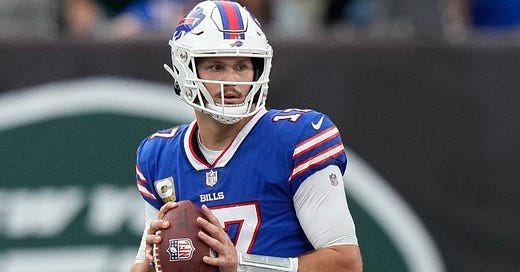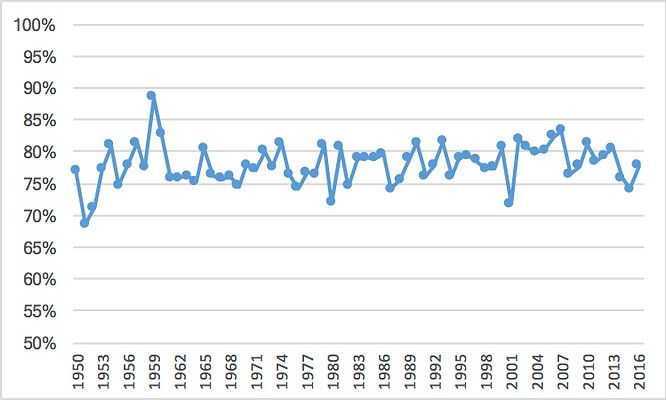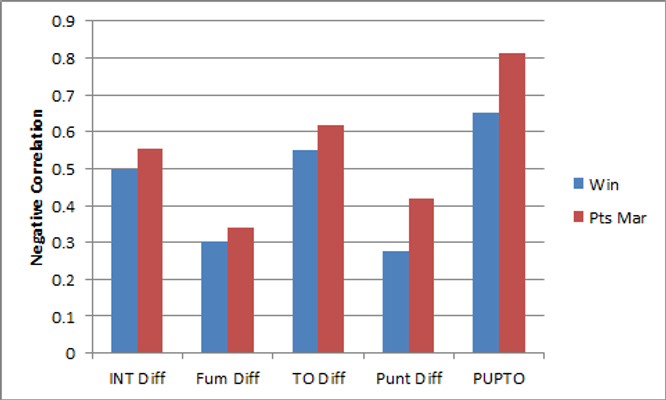Turnovers Are Overrated - The Josh Allen Theorem
They've been lying to you. Taking care of the ball is not how you win games. Great offence is how you win games, and I'm going to prove it.
(If you need a primer on EPA, feel free to click here to read my beginner's guide. Enjoy the article!)
I know. I know. I hear what you're about to say. Any discussion about turnovers has to begin with this graph:
Over the years in the NFL, as everything else about the game has radically changed, the rate at which the team with fewer turnovers wins the game is astonishingly flat. With very few outliers, the team that wins the turnover battle wins the game between 75 and 80 percent of the time.
Many people see this as the beginning and ending of the discussion about the importance of turnovers in the NFL. After all, 80 percent is a lot right? If a team can win the turnover battle every game, independent of anything else, they'll win 13-14 games. No further questions asked. A fan of any team would take that.
There's nothing false about that. They would take it, but the entire premise of the argument is based on a misunderstanding. It's a relatively simple mistake to make, but still crippling towards a solid understanding of the true meaning of turnovers.
This rate does not hold independent of all else, and the key is the first two columns of this graph:
There's a lot to see in this graph, but what I want you to look at is the variation between the two types of turnovers. In terms of how impactful they are towards winning, interceptions hurt a team dramatically more than fumbles do.
This doesn't make any sense. First of all, in terms of EPA (Expected Points Added), fumbles often hurt a team more than interceptions, because they tend to happen closer to the line of scrimmage than interceptions, meaning the opponent gets better field position off of the turnover. Even ignoring the EPA considerations, why should interceptions mean so much more than fumbles?
The truth is, they don't, even though the data says they do.
Why is this?
Fumbles by their nature are very luck based. There is no pattern in terms of better teams fumble less and worse teams fumble more. For example, the top seven teams in 2023 by fumble differential were the Bengals, Giants, Buccaneers, Packers, Saints, Steelers, and Texans. The Giants were terrible, the Steelers, Bengals, Buccaneers, and Saints were all fringe-playoff type teams. The Packers and Texans were both solid playoff teams that deserved the playoff wins they got, but do you notice the lack of pattern here? We’re at the top of the league, and yet there are no great teams.
The same cannot be said for interceptions. Interceptions are to a great degree in the control of the offences involved in the play. This is not true of defence (better defences don't get more interceptions), but it is true that worse offences tend to throw more interceptions, meaning that unlike fumbles there is a pattern. The better teams generally have better interception differentials. For reference, here are the top five in 2023:
Ravens, 49ers, Cowboys, Steelers, Saints
Here we find the NFL's three best teams by record, in order, right at the top of the list. Their supporting cast in the top five is not great, buoyed by Mr. Safety Kenny Pickett and an underrated Derek Carr season, but the Saints and Steelers were at least fringe playoff calibre teams. There is much more correlation here than in the fumble statistics.
We likely all knew this already. Interceptions are much more in control of the offence than fumbles, so what does that mean?
The main way team quality can contribute to the turnover differential is through interceptions, and the main way turnover differential contributes to winning (or losing) is through interceptions. What does this mean?
It means that turnover differential in itself is not as important as it seems. It’s a conflation of the importance of the difference in the quality of the two offences.
What is important is that in any football game, one team is better than the other, and the better team tends to have the better offence. The better offence tends to commit less turnovers, and this helps them win, but even in a game where neither team commits any turnovers (where therefore the turnover battle has no winner, a scenario not included in the upper graphs at all) the team with the better offence is still more likely to win. That's a simple concept. Even in a game where neither team commits a turnover, would you bet on the NFL's best offence (Buffalo Bills) or its worst (Cleveland Browns)?
Therefore, I believe that turnover differential is overrated in football discourse, because a lot of the time the turnover differential can be explained by one offence (not defence. It's crucial you remember that) purely being better than the other, and the gulf in quality between the two offences is the factor that decides the game, not turnover differential.
As evidence for my theory, I went through every NFL game between the time the NFL went to a 17 game season in 2021, and the end of the 2023 season. Not including playoffs, there were 815 NFL games in this period. For each game I noted who was the better QB in that game (decided by who was higher on my tier list for that year), and who won the turnover differential for that game.
This was a quick and dirty exercise, with some serious issues in terms of data quality. For example, there was no measure of how much better each QB was. Patrick Mahomes being the better QB than Zach Wilson was counted just the same as Zach Wilson being better than Tommy DeVito, so don't take this extremely seriously. However, it was still able to reveal some valuable insights into the true value of turnovers.
Of the 815 NFL games played between 2021 and 2023, 634 of them had a winner in the turnover battle (meaning both teams didn't commit the same number of turnovers). Of these 634 games, the team with the better QB had fewer turnovers 374 times. That's 59%, which lends some credence to my theory that the turnover battle is capturing some other qualities about the teams than strictly their turnovers on the day, but that leaves 260 games where the team with the better QB lost the turnover battle.
For my hypothesis to be correct (that turnovers don't explain as much as people think they do), I would expect that when a team is better at the QB position (likely meaning better on offence) than their opponents, but turns the ball over more anyway, they should still win a solid amount of the time, because they are still better than their opponents.
Over the 2021-2023 seasons, this holds true, as in the 260 times the team with the better QB lost the turnover battle, they still managed to win the game 106 times. 106-154 does not seem like a great record, but that's a 41% winning percentage, which is much higher than the 20-25 percent chance they're supposed to have, and that TV broadcasts tell you all the time.
What brings the total down to the 20-25 percent range every year is the bad QBs who turn the ball over a lot. Of the 374 times a team with the worse QB lost the turnover battle between 2021 and 2023, they've managed to win the game just 40 times. 40-334 is dramatically worse than 106-154. It's just a 10.6% winning percentage.
When you add these two things together, you get that the team who's lost the turnover battle has won 146 games in 634 tries since 2021. That's 23%. Right where it should be, but we've now seen that this does not apply equally to everybody. When you're the team with the better QB who's lost the turnover battle, you still have a 41% chance to win. When you've got the worse QB and lose the turnover battle, you're pretty much dead with a 10.6% chance.
This massive gulf between the two figures indicates that it's not strictly turnovers causing these losses. It it was, the quality of the QB would be unimportant. The two numbers would be the same. Since they do differ, that means that turnovers do not affect the game as much as the difference in the quality of teams does. I cannot quantify this difference with the rudimentary analysis I've done here. I can do a sophisticated game by game analysis to try to quantify the true value of being good vs the value of not turning the ball over if there's any demand for it.
In sum, it is true that teams who lose the turnover battle lose the game 75-80 percent of the time, but this is only a technical truth. This means that people (coaches and fans alike) who worry about minimizing turnovers perhaps should calm down a little bit in their quest to try to never make mistakes, and go back to trying to just be good at offence. Being good at offence means you only lose the turnover battle 40% of the time, and 40% of that time you'll win anyway.
This isn't just my inner nerd either. The real football teams (and players) are beginning to understand this again. We've been seeing this play out in the NFL over the last few seasons. Patrick Mahomes posted a near career high interception rate en route to his best season since 2018, and another Super Bowl win in 2022. Brock Purdy is nothing special at avoiding interceptions, but he was still able to lead the NFL's best offence (by far) in 2023. Josh Allen in this stretch got worse and worse at avoiding turnovers by the year (a trend he’s reversed in 2024, with no real benefit), but none of that hurt the Bills, who were a top team in the AFC all three seasons. In fact, I would consider him to be the poster child of this phenomenon, which is why I've termed the Josh Allen Theorem:
Do not try to minimize turnovers. Try to be good at offence. These are not mutually exclusive. You can do both at once, but if only one is available, always be like Josh Allen and choose to be better at offence. Moving the ball down the field is more valuable than managing turnovers.
Kenny Pickett was elite at avoiding turnovers. He was terrible at offence. Where has that gotten him? He should've studied the Josh Allen theorem.
Just for reference, here are some teams that followed the Josh Allen theorem in 2023:
Kansas City Chiefs. 28th in turnover differential. 11th in offence (measured by EPA/Play). Super Bowl Champions.
Detroit Lions. 16th in turnover differential. 8th in offence. NFC Championship game appearance.
Buffalo Bills. 13th in turnover differential. 3rd in offence. 11-6 record and a playoff win.
Green Bay Packers. 17th in turnover differential. 5th in offence. Solid playoff team who gave SF everything they wanted and more despite a defence that could not hold its end.
Philadelphia Eagles. 27th in turnover differential. 7th in offence. Carried a defence hellbent on destroying their season to a playoff spot.
That's quite a list, and that's just the teams who were not great at both not turning the ball over and at offence (like Baltimore, SF, and Dallas). For all the turnover defenders out there, here are some teams that ignored the Josh Allen theorem:
New York Giants. 1st in turnover differential. 30th in offence. Takeaways can only help you so much. The Giants were terrible in 2023.
New Orleans Saints. T-3rd in turnover differential. 14th in offence. Took a Super Bowl calibre defence and missed the playoffs with it. Again.
Cincinnati Bengals. 5th in turnover differential. 13th in offence. Joe Burrow has always been good at not turning the ball over, but the Bengals struggle to win because he comes up a little short in terms of being good at offence. 2023 was no exception.
Pittsburgh Steelers. T-3rd in turnover differential. 23rd in offence. A team tied for third in turnover differential should be better than a fringe playoff team, but no can do with this bad of an offence.
New York Jets. 23rd in turnover differential. 32nd in offence. This 2023 Jet defence had something, but couldn't overcome the nightmare on offence.
I think these examples illustrate the point. If you can be elite either at not turning the ball over, or at moving the ball and playing great offence, always choose to be a great offence. It does not matter if great offences turn the ball over a lot. They're still great offences, and great offences win games. Ask Kansas City. Ask Buffalo. Ask Green Bay.
Nobody here is kidding themselves. The way to be a great team is to be great both at not turning the ball over and at moving the ball on offence. In 2023, that was SF. That was Baltimore. That was Dallas, but the way to be a good team is to have great offence, and not care about turning the ball over or not.
How ironic that the shining beacon of proof of the Josh Allen theorem is Patrick Mahomes and the Kansas City Chiefs, but it's true. The Kansas City Chiefs were not just bad but one of the worst teams in the NFL in the turnover margin in 2023, and they won a Super Bowl anyway, because they had great offence.
How much more proof can you ever need than a Super Bowl championship? I mean, there's always two championships in a row (2022 Kansas City. 22nd in turnover differential. 1st in offence), but I'm not sure we need to go that far. I consider my point proven.
From here on in remember: when TV broadcasts tell you that teams that lose the turnover differential win just 23% of the time, that's technically correct, but they're still lying to you. It's 41% if your QB is better than the opponent's, and 10.6% if he isn't.
Those are the real numbers you need to pay attention to. Ensure that you're studied up on your Josh Allen theorem. No matter what people on Twitter tell you, the old heads (like Bill Parcells, who famously didn’t care about his QBs throwing interceptions) are correct about this one. Teams with great offences that turn the ball over all the time qualify for the playoffs. Teams that take care of the ball but can't get down the field win nine games or less.
Don't be so worried to make mistakes, and yell at your team when they are.
You may be wondering: If turnovers aren't so bad, how do I tell if my offence is playing well or not? See this article to see me delve into that topic.
Thanks so much for reading.





